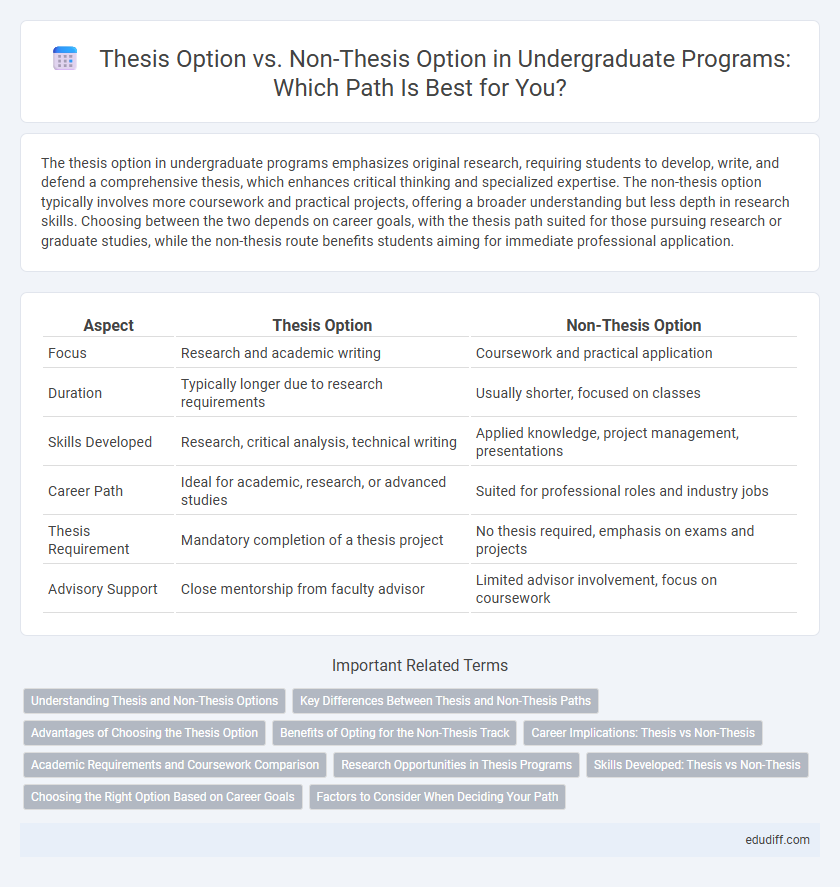The thesis option in undergraduate programs emphasizes original research, requiring students to develop, write, and defend a comprehensive thesis, which enhances critical thinking and specialized expertise. The non-thesis option typically involves more coursework and practical projects, offering a broader understanding but less depth in research skills. Choosing between the two depends on career goals, with the thesis path suited for those pursuing research or graduate studies, while the non-thesis route benefits students aiming for immediate professional application.
Table of Comparison
| Aspect | Thesis Option | Non-Thesis Option |
|---|---|---|
| Focus | Research and academic writing | Coursework and practical application |
| Duration | Typically longer due to research requirements | Usually shorter, focused on classes |
| Skills Developed | Research, critical analysis, technical writing | Applied knowledge, project management, presentations |
| Career Path | Ideal for academic, research, or advanced studies | Suited for professional roles and industry jobs |
| Thesis Requirement | Mandatory completion of a thesis project | No thesis required, emphasis on exams and projects |
| Advisory Support | Close mentorship from faculty advisor | Limited advisor involvement, focus on coursework |
Understanding Thesis and Non-Thesis Options
Thesis and Non-Thesis options in undergraduate programs offer distinct academic pathways tailored to different learning and career goals. The Thesis option emphasizes in-depth research, critical analysis, and the development of a scholarly paper under faculty supervision, preparing students for graduate studies or research-intensive careers. The Non-Thesis option prioritizes coursework and practical experience, often including projects or comprehensive exams, catering to those seeking professional skills and direct entry into the workforce.
Key Differences Between Thesis and Non-Thesis Paths
The thesis option typically requires undergraduate students to conduct original research and produce a comprehensive thesis paper, emphasizing deep subject mastery and critical analysis skills. In contrast, the non-thesis option centers on coursework and practical experience, allowing for a broader educational scope and often includes a capstone project or comprehensive exams. Choosing between these paths depends on career goals, with the thesis option favoring research-oriented roles and the non-thesis option suited for professional practice or continued study without extensive research.
Advantages of Choosing the Thesis Option
Selecting the thesis option in undergraduate studies offers a distinctive advantage by enabling in-depth research experience, fostering critical thinking and analytical skills that enhance academic rigor. This pathway facilitates direct mentorship from faculty advisors, allowing students to develop specialized expertise and contribute original knowledge to their field. Graduates with thesis experience often gain a competitive edge in pursuing graduate education or research-intensive careers due to their demonstrated ability to conduct systematic inquiry and synthesize complex information.
Benefits of Opting for the Non-Thesis Track
Opting for the Non-Thesis track in undergraduate programs offers enhanced flexibility by allowing students to engage in diverse coursework and practical experiences that build versatile skills. It accelerates degree completion, making it ideal for those aiming to enter the workforce promptly or pursue professional certifications. This option also reduces research-related stress, enabling students to focus on applied knowledge and career-oriented competencies.
Career Implications: Thesis vs Non-Thesis
Choosing the thesis option in undergraduate studies often enhances research skills and opens pathways to graduate education or research-intensive careers, providing a strong foundation in analytical thinking and project management. The non-thesis option typically emphasizes practical knowledge and coursework, making it ideal for students aiming for immediate employment in industry roles that value applied skills and professional certifications. Employers in academia and specialized research sectors generally prefer candidates with thesis experience, while those in business or technical positions may prioritize the non-thesis route for its focus on practical expertise.
Academic Requirements and Coursework Comparison
The thesis option in undergraduate programs typically demands the completion of original research, extensive writing, and a formal defense, emphasizing in-depth academic rigor and critical analysis. In contrast, the non-thesis option prioritizes coursework, requiring a higher number of credits in specialized classes, comprehensive exams, or capstone projects to demonstrate mastery of the subject. Both track options maintain core academic requirements but differ significantly in the balance between research-oriented work and structured course-driven learning.
Research Opportunities in Thesis Programs
Thesis option programs provide extensive research opportunities that allow undergraduates to engage deeply with their field, develop critical analytical skills, and contribute original findings to academic discourse. These programs often include mentorship by faculty advisors, access to laboratory resources, and participation in conferences, enhancing practical experience and scholarly networking. In contrast, non-thesis options typically emphasize coursework and exams, limiting hands-on research exposure and independent investigation.
Skills Developed: Thesis vs Non-Thesis
Thesis option cultivates advanced research, critical thinking, and academic writing skills through the development and defense of an original study. Non-thesis option emphasizes practical skills, such as project management, applied problem-solving, and professional communication. Both paths foster discipline-specific knowledge but differ in developing research-intensive versus application-oriented competencies.
Choosing the Right Option Based on Career Goals
Choosing between the thesis and non-thesis options in undergraduate programs depends heavily on career aspirations; students aiming for research-intensive fields or graduate studies often benefit from the thesis track, which hones critical thinking and in-depth analysis skills. The non-thesis option suits those targeting immediate employment, emphasizing practical knowledge and professional skills through coursework and internships. Aligning the choice with long-term career objectives ensures the most efficient skill development and academic experience.
Factors to Consider When Deciding Your Path
Selecting between the thesis and non-thesis options involves evaluating factors such as your career goals, time commitment, and research interest. The thesis option requires significant research skills and dedication to producing original work, which is beneficial for those pursuing graduate studies or research roles. Conversely, the non-thesis option emphasizes coursework and practical experience, making it suitable for students aiming for immediate employment or professional development.
Thesis Option vs Non-Thesis Option Infographic

 edudiff.com
edudiff.com